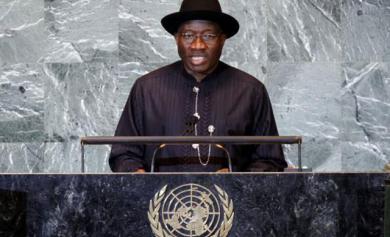
President Goodluck Ebele Jonathan has once again insisted that the last general elections held in Nigeria were credible at all levels.
The president, who maintained this while briefing world leaders at the ongoing 66th session of the United Nations General Assembly in New York, his administration was able to conduct credible and transparent general elections in April 2011.
He said: “When I stood before this Assembly last year, I gave a solemn pledge that Nigeria will conduct free and credible elections in the second quarter of this year. I am glad to report that we, indeed, conducted what have been adjudged credible and transparent general elections in April 2011.”
President Jonathan also used the opportunity to thank the United Nations and all other organisations and nations that assisted Nigeria to achieve the credible electoral processes.
He said: “The elections are now behind us and the Government which I head is well on course to implement our programmes of Transformation, a strategic plan for the delivery of the dividends of democracy to citizens, and for preparing our country for the challenges of the future.”
He added that there was a renewed sense of optimism and self-belief in the ability to re-create a new Nigeria on the principles of personal freedoms, democracy, good governance and rule of law.
He also said that credible elections would set Nigeria and other West African countries along the path of political stability, progress, good governance and sustainable development, some of which benefits that are already being experienced. ?
“The progress we have made could not have been possible without the support of the United Nations” he noted.
Speaking on human rights, President Jonathan said: “In order to demonstrate our commitment to human rights, Nigeria recently ratified the Convention on the Rights of Persons with Disabilities and acceded to four other international human rights instruments, including the optional protocol on the Convention against Torture and Migrant Workers.”
He also noted that his government, in its bid to uphold human rights, has also passed into law the National Human Right Commission Amendment Act (2011), Legal Aid Council Amendment Act (2011) and Freedom of Information Act (2011). ?
Jonathan further stated that Nigeria would continue to accord the highest priority to human rights issues as they speak directly to the dignity and inalienable rights of humanity.
The president also proposed the creation of a conflict mediation commission within the office of the United Nations Secretary-General to develop strategies for the resolution of disputes across the world.
Such a commission would be tasked with collating information on conflicts, identifying the parties to them and developing rules of engagement, including the sanctions that would apply to those who obstruct efforts to resolve disputes peacefully, he said.
?

